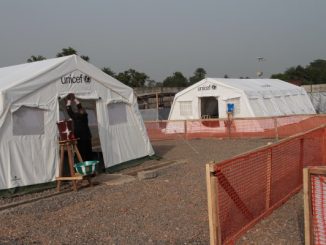
The International Telecommunications Union (ITU) defines an international telecommunications gateway as “any facility through which electronic communications (voice, data and video) can be sent between the domestic networks of one country and another.” In practice, the gateways provide links, either to an international (often submarine) cable system, or to a satellite through an Earth station. The purpose is to control incoming and outgoing voice and data traffic.
The World Bank funded the landing of Sierra Leone’s connection to the 17,000 kilometre Africa Coast to Europe (ACE) sub marine fibre cable in Freetown. However, one of the conditions attached to the funding was the liberalisation of the international gateway system, Igateway, which has been monopolised by Sierratel for more than a decade. One of the arguments for removing the Sierratel monopoly is that it would reduce the cost of Internet access and telephone calls. It will also enhance competition and thus creating a level playing field for the telecoms operators. The high cost of international calls when Sierra Leone is compared with other countries is directly related to the monopoly of the Igateway.
The best way to manage a liberalised gateway system is to have an experienced and credible technical operator to monitor the operators of separate gateways in the country effectively and efficiently. Ideally, this technical operator should be highly experienced in this kind of operation. There should also not be any involvement in any kind of competitive or business activity with the mobile network operators, to ensure the neutrality and integrity of the monitoring services.
To the best of our knowledge, only one company meets all these criteria in Africa: Global Voice Group. This telecoms management and revenue-assurance expert is well positioned to help NATCOM and the government of Sierra Leone deploy an international gateway monitoring system (IGMS) in order to ensure the security, integrity and performance of the telecommunications networks. There are obvious benefits as the IGMS will provide robust management, fraud detection and a transparent system for revenue collection from voice and data traffic. It is being used all over the world including in neighbouring Guinea and Liberia, Congo, Gabon, Tanzania, Rwanda…. IGMS is also generally recommended by high profile institutions the world over—not least the World Bank. Some of the benefits of an international gateway monitoring system include, but are not limited to:
• revenue assurance
• high volume capacity
• increased accessibility of subscribers
• enhanced security
In terms of the last point—enhanced security—one cannot stress enough the importance of security. Mohamed Bangura, Director General of NATCOM—the National Telecommunications Commission in Sierra Leone—has revealed that the government is currently losing huge amounts of revenue to SIMbox fraudsters on a daily basis. By-passing the international gateway poses very serious security threats and the IGMS will provide a mechanism for intercepting voice and data traffic, terrorist activities, drug trafficking, child trafficking and cyber attacks.
Running an International Gateway in telecommunications without a monitoring system is tantamount to running an immense international airport without Immigration and Customs to challenge passengers wishing to enter the country—with all the associated dangers and risks.
The liberalised gateway market will be a giant stride forward for Sierra Leone as it will immediately lead to a massive reduction in tariffs for outgoing calls from the local operators. Incoming calls are very expensive for Sierra Leoneans calling from overseas as the overseas telecoms carriers are taking more money per minute than they should be. NATCOM has guaranteed an instant minimum reduction of 40% for outgoing calls when the gateway is fully liberalised. This is huge reduction.
It is clear that an effective and efficient monitoring and regulatory mechanism must be put in place before the target date for the opening up of Igateway. Not only would it be prudent for the government of Sierra Leone in view of the security risk, but it would also help to boost government revenue by stopping leakages. The international gateway monitoring system would protect the International Gateway System to the benefit of all stakeholders and players in the Sierra Leonean telecoms sector: NATCOM, the government of Sierra Leone, the telecoms operators and consumers.



